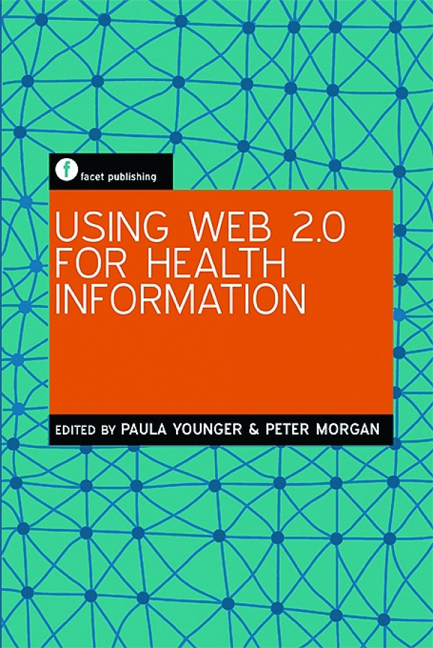Book contents
- Frontmatter
- Contents
- Preface
- Acknowledgements
- Contributors
- Glossary
- Introduction
- Part 1 The basics
- Part 2 Web 2.0 and the implications for health information
- Part 3 Web applications in health information provision: some practical examples
- 9 Web 2.0 in health libraries
- 10 RSS (Really Simple Syndication): helping faculty and residents stay up to date
- 11 Using mashups in health information provision
- 12 Twitter in a hospital library
- 13 Using Web 2.0 to facilitate staff development
- Part 4 The future
- Index
10 - RSS (Really Simple Syndication): helping faculty and residents stay up to date
from Part 3 - Web applications in health information provision: some practical examples
Published online by Cambridge University Press: 08 June 2018
- Frontmatter
- Contents
- Preface
- Acknowledgements
- Contributors
- Glossary
- Introduction
- Part 1 The basics
- Part 2 Web 2.0 and the implications for health information
- Part 3 Web applications in health information provision: some practical examples
- 9 Web 2.0 in health libraries
- 10 RSS (Really Simple Syndication): helping faculty and residents stay up to date
- 11 Using mashups in health information provision
- 12 Twitter in a hospital library
- 13 Using Web 2.0 to facilitate staff development
- Part 4 The future
- Index
Summary
Introduction
It is imperative that clinicians and researchers in the health sciences stay current with advances in their fields. Many find themselves pressed for time and struggle with the volume of information available to them (Davies, 2007; Wallis, 2006). RSS (Really Simple Syndication) offers a relatively simple approach to managing the flow of new information that is published on the web. This chapter presents an overview of RSS and a case study of teaching RSS to health sciences faculty and medical residents.
What is RSS?
RSS is a web-based syndication format that allows information feeds from multiple websites to be aggregated into one place. Typically, the information from an RSS feed is sent directly to a user's desktop or web browser via a feed reader (also known as an aggregator), so that whenever a website is updated the user receives the new information automatically.
From a technology perspective, RSS is an XML-based format which is fairly simple for information services and content providers to produce and for consumers to use. It is commonly used to subscribe to blogs and podcasts, as well as to generate dynamic web content (e.g. personalized home pages such as iGoogle). RSS originated in the late 1990s but did not become popular until the rise of Web 2.0 in the mid 2000s.
RSS in library and information services
Many librarians have identified RSS as a beneficial technology for current awareness. Librarians have traditionally been involved with the provision of current awareness services such as selective dissemination of information (SDI). These services have taken a variety of forms, from creating specialized publications that identify new literature to setting up electronic database alerts (Anderson, 1998; Shultz and De Groote, 2003). RSS feeds are perceived as being especially valuable for academics and professionals because they make use of a single interface (the feed reader) to manage information from new media such as websites and blogs, as well as from traditional information sources such as scholarly journals (Anderson, 2006; Cooke, 2006; Giustini, 2006).
Much of the journal literature about RSS is purely descriptive, focusing on what the technology is and how it can be used in libraries or information services (Cohen, 2008; Holvoet, 2006; Tennant, 2003). In implementation, RSS has been used to promote new resources, deliver library news, and provide database alerts (Armstrong, 2007; Blansit, 2006; Corrado and Moulaison, 2006).
- Type
- Chapter
- Information
- Using Web 2.0 for Health Information , pp. 107 - 114Publisher: FacetPrint publication year: 2011



